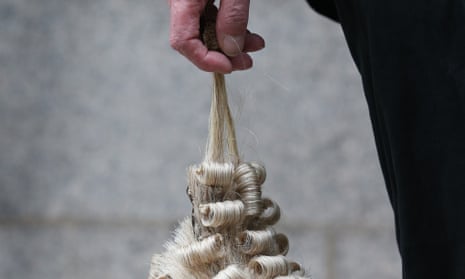Young people today. It’s widely understood that they’re getting a raw deal. They’re saddled with lots of debt if they opt for higher education, or often, poor pay and conditions if they don’t. Property prices are so high in parts of the country, and social housing so scarce, that renting their own place, let alone owning it, seems like a fantasy. And even the most highly qualified of ambitious young professionals can find that they are expected to work for free, to get the experience that they need.
So, it’s a bit of a sell, suggesting that the plight of pupil barristers is particularly urgent. They have debt, like many others. They have problems finding a reasonably priced place to live, like many others. And the work they do during their internships is paid: not highly paid, but paid, while a reliable career structure lies ahead of them.
In fact, some pupil barristers can still look forward to a bright, lucrative and rather glamorous future, in corporate law, for example. Which is part of the problem. This makes the ones who want to specialise in areas of the law where material success is harder to come by wonder if they’re being mugs.
Pupils in criminal law, immigration law and family law, where legal aid cases dominate, and political hostility can be rabid, are watching highly regarded chambers – such as Michael Mansfield QC’s chambers, Tooks – go to the wall. Many are wondering if they should get out while the getting’s good themselves.
It’s not just legal aid that is a problem, though that’s bad enough. Criminal legal aid fees have been cut still further in the past year, on top of the gradual erosions that have been happening for decades. But not only are pupil barristers not being paid as much per case, there aren’t nearly as many cases going to trial.
One pupil barrister told me that she’d turned up at court for a case, only to find a man pacing about, very agitated. He was about to be sentenced for assault, in a different case, but his barrister hadn’t turned up. The pupil offered to represent the man herself.
He told her that he’d pleaded guilty to assaulting a woman, even though he was innocent. He had hit the woman, who he’d never seen before, in the street. But it was in self-defence, because she’d been brandishing a knife at him. He’d pleaded guilty because, under legislation brought in by the coalition government, all convicted defendants have to pay a criminal court charge.
For an offence that can only be heard in a magistrate’s court, it’s £150 if you plead guilty right away. Plead not guilty, then get found guilty, and it’s £520. Offences that can go to magistrate’s or crown cost a defendant £180 or £1,000. In the crown court, it’s £900 or £1,200. Payment is mandatory, even for the destitute.
This man had decided that since he had no witnesses to support his story, he couldn’t risk being found guilty and also owing a grand. But the pupil who’d stepped into the breach did ask for a check to be rundid on the woman’s name. She found that the woman had been arrested for carrying a knife that day. Witnesses had seen her threatening other people in the street. Had the man pleaded not guilty, and this compelling evidence been presented to a court, he’d have been vindicated.
The Law Society is concerned that this “outrageous” – as the Law Society Gazette calls it – charge is causing similar miscarriages of justice ten to the dozen. But again, this isn’t the only problem.
This legislation greatly narrows the range of cases going to trial, and therefore greatly narrows the breadth of experience that the recorders, judges and law lords of the future will have worked through. This isn’t just about innocent people being found guilty. It’s about guilty people being found innocent, too. Fewer cases to defend means fewer cases to prosecute as well, so solid prosecution experience is also harder to gain.
Other changes, which should concern all who understand the fundamental importance of a robust system of law, are making a bad situation worse.
Quietly, the system under which anyone who is arrested can ask the duty solicitor to supply him with a lawyer has been eroded. The Bar Code of Conduct is clear about the traditional “cab rank” rule. “A barrister supplying advocacy services must not withhold those services on any of three specified grounds, namely the nature of the case being objectionable; the client having unacceptable conduct, opinions or beliefs; and the source of funding.”
But in November 2003, the Bar Council ruled that the fee paid under legal aid was already too meagre to be considered “a proper fee”. So anyone needing a lawyer and also needing legal aid can no longer rely on the cab rank system to supply him with representation. These are exactly the people it existed to protect.
The government’s proposed “solution” is to further limit the number of firms who are licensed to provide “duty work”. Currently, more than 1,500 firms have contracts to provide this service. If the Conservatives’ plans go though, there will be just more than 500. The idea that it’s important to practise law, in order to get really good at it, seems alien to this government.
It’s probably in immigration law that the pool of opportunity to gain experience has been drained most egregiously. The 2014 Immigration Act removed all appeal rights for migrants except for those claims that involve an asylum and/or human rights element. Again, opportunities for young lawyers to cut their teeth have been catastrophically diminished, devaluing not only the legal process of today, but the legal process of the future as well.
In many cases, in the criminal and family courts, as well as immigration, people representing themselves have increased a lot. These changes are meant to save money. But as one immigration law pupil said: “It’s well-known that litigants-in-person render the court process more protracted and costly. Judges are required to act in a way that is more inquisitorial, providing assistance to the litigant to flesh out the legal issues, and the litigant usually won’t know which issues are relevant anyway so this process takes a lot of time.”
Ultimately, justice is expensive. These radical changes, and others, mean that injustice is getting quite expensive, too.
- This article was amended on 4 September 2015. An earlier version said that “Criminal legal aid fees have been cut by 17.5% in the past year”.

